Trying to decide between Rocket.net vs Kinsta to host your WordPress sites?
These are two excellent managed WordPress hosts, so you won’t go wrong either way.
In fact, at least personally, these are two of the managed WordPress hosts that I recommend the most — so it’s tough to pick between them.
But you need to make a choice — so how do you pick the right one for your situation?
In this hands-on Kinsta vs Rocket.net comparison, we’ll dig into the details to help you choose the right host.
General Introductions to Rocket.net and Kinsta
Before we get to the more hands-on comparison, let’s quickly run over the basic details of these two hosts.
Introducing Rocket.net
Founded in 2020, Rocket.net is the new kid on the block when it comes to managed WordPress hosting.
However, it comes from an experienced team and has rapidly built a name for itself in managed WordPress hosting, as well as agency and enterprise WordPress hosting.
One of the most unique details about Rocket.net is that it was built from the ground up to have Cloudflare play a big part in its infrastructure.
As far as I’m aware, Rocket.net was also the first managed WordPress host to do full-page caching on Cloudflare’s network by default. Maybe someone else did it first, but I don’t remember seeing this approach until Rocket.net hit the scene.
There are a few big benefits to Rocket.net’s tight integration:
- Fast global load times because Rocket.net caches your site’s pages on Cloudflare’s global network (not just static assets such as images)
- Built-in optimization features such as automatic image optimization and code minification
- Security protections at the edge (in addition to another firewall at the server level)
Beyond that, you also get all the “standard” features that you’d expect from a managed WordPress host, such as automatic backups, staging sites, a custom hosting dashboard, and so on.
Rocket.net has also built some unique features for agencies that can make it an especially good option if you want to resell hosting to your clients or otherwise host clients’ websites.
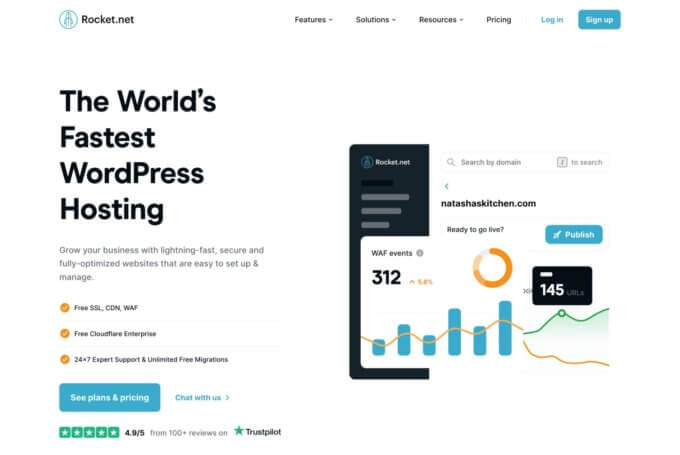
Introducing Kinsta
Since its launch in 2013, Kinsta has rapidly grown to become one of the largest and most well-known managed WordPress hosts.
From the beginning, Kinsta has offered top-tier performance, quality support, and tons of useful tools.
Kinsta is pretty much everything you’d expect from a “true” managed WordPress host (not a cheap shared host masquerading as managed WordPress hosting).
The Kinsta team also goes above and beyond when it comes to offering helpful tools, including some unique options such as its own local WordPress development tool (DevKinsta) and its own application performance monitoring service (Kinsta APM).
In my opinion, Kinsta has the best hosting dashboard and the most useful tools of any managed WordPress host, and you can tell it’s an area where they’ve really invested.
Over the past couple of years, Kinsta has also started shifting to integrate Cloudflare into its hosting stack, implementing a similar approach to Rocket.net.
In late 2022, Kinsta rolled out edge caching on Cloudflare’s network, which lets you cache your site’s pages on Cloudflare’s global network.
You also get other performance benefits, such as automatic image optimization and code minification. In early 2023, Kinsta introduced Early Hints, a web standard to further improve site load times for its clients.
In addition to the traditional WordPress setup, you can also host headless WordPress sites on Kinsta’s platform using their Static Site tool.
In 2022, Kinsta expanded beyond WordPress hosting for the first time, launching new services for application hosting and managed database hosting.
The scope of Kinsta’s services was further expanded in 2023 when it introduced a free service to host static sites.
That probably won’t play a role in helping you decide between Kinsta vs Rocket.net, but it might if you want to be able to host non-WordPress applications in the same spot as your WordPress sites.
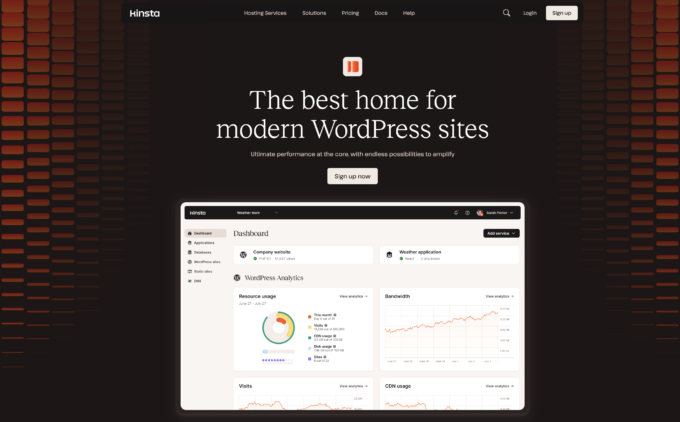
Feature Comparison Tables
Now, let’s dig into a more hands-on Rocket.net vs Kinsta comparison, starting with a few comparison tables to help you understand the features that each host offers.
Table key:
- ✅ – The host offers this feature as part of its regular plans.
- ✅💰 – The host offers this feature but it’s an extra fee.
- ❌ – The host doesn’t offer this feature.
Core Features
First, let’s look into the core features of Rocket.net vs Kinsta — as you can see, there’s not a huge difference here between the two hosts:
| Features | Rocket.net | Kinsta |
|---|---|---|
| Custom hosting dashboard | ✅ | ✅ |
| Cloudflare page caching | ✅ | ✅ |
| Built-in CDN | ✅ | ✅ |
| Automatic image optimization | ✅ | ✅ |
| Automatic code minification | ✅ | ✅ |
| Free SSL certificates | ✅ | ✅ |
| Automatic backups (daily) | ✅ | ✅ |
| Automatic backups (hourly) | ❌ | ✅💰 |
| Backup retention | 14-30 days | 14-30 days |
| External backups | ❌ | ✅💰 |
| Staging sites | ✅ | ✅ |
Features for Developers/Advanced Users
When it comes to features for developers or other advanced users, I think that Kinsta has the edge.
You get some unique value-added features such as local WordPress development (DevKinsta) and application performance monitoring (Kinsta APM).
Rocket.net does have some unique features in its advantage, such as WordPress activity logging (that won’t bloat your site’s database) and an in-browser WP-CLI terminal.
But overall, Kinsta offers a more robust toolset for advanced users:
| Features | Rocket.net | Kinsta |
|---|---|---|
| Redis | ✅ | ✅💰 |
| Redirect manager | ❌ | ✅ |
| Geolocation tool | ❌ | ✅ |
| WordPress activity logging | ✅ | ❌ |
| WP-CLI | ✅ | ✅ |
| In-browser WP-CLI terminal | ✅ | ❌ |
| Local development tool | ❌ | ✅ (DevKinsta) |
| Application performance monitoring tool | ❌ | ✅ (Kinsta APM) |
| Partial staging pushes | ❌ | ✅ |
Features for Agencies and/or Resellers
When it comes to features for agencies and/or hosting resellers, I think that Rocket.net has the edge.
If you’re looking to resell hosting to your agency’s clients (or to other people), Rocket.net offers some really handy tools such as the option to white-label the hosting dashboard, embed it in your site, and integrate with WHMCS for billing management.
Rocket.net even includes an API that lets you provision sites, which allows you to build your own custom workflows and solutions:
| Features | Rocket.net | Kinsta |
|---|---|---|
| Site transfer | ✅ | ✅ |
| White-label hosting dashboard | ✅ | ❌* |
| Automated site provisioning (API) | ✅ | ✅ |
| WHMCS integration | ✅ | ❌ |
| Local development tool | ❌ | ✅ (DevKinsta) |
*Kinsta does let you white-label the Kinsta Cache plugin that appears inside users’ WordPress dashboards, but you can’t white-label the actual Kinsta hosting dashboard.
Performance and Speed Data
How quickly your site loads is one of the most important considerations when choosing a WordPress host.
There’s good news here:
Both Rocket.net and Kinsta offer excellent performance no matter where your visitors are coming from.
For static sites, you probably won’t notice much difference, to be honest, because both hosts will fully cache your site’s pages on Cloudflare’s global network whenever possible.
Both hosts also let you access real-time image optimization and code minification powered by Cloudflare.
For blogs or other static content sites, you should expect that ~95%+ of visits to your site will be served from Cloudflare’s cache.
For dynamic sites — e.g. WooCommerce stores and membership sites — you’ll need to rely on your site’s origin server more often.
Kinsta exclusively uses the Premium Tier of Google Cloud Platform for its infrastructure and their C2 and latest C3D machines, with 36 different data center options all around the globe, including multiple options in North America, Europe, Africa, Asia, South America, and Australia.
Rocket.net, on the other hand, uses its own private cloud composed of multiple vendors, including Performive, PhoenixNAP, OVH, and ServersAustralia.
You can choose from seven different data centers — two USA data centers (Virginia and Arizona), three European data centers (London, Amsterdam, and Frankfurt), and two Asia/Pacific data centers (Singapore and Sydney).
Rocket.net vs Kinsta Performance Tests
Again, most static WordPress sites won’t notice a huge performance difference, given that both hosts will serve your site’s static pages via Cloudflare.
To demonstrate this, I set up an identical test site on both hosts using our lightweight Sydney theme and one of its Elementor-powered demo sites. I didn’t make any performance optimizations beyond the built-in tools that both hosts offer.
I then used WebPageTest to test from a few different locations with the following configuration:
- Test from: Salt Lake City, Utah, USA + London, UK + Singapore
- Connection speed: FIOS throttled connection – 20/5 Mbps (this creates a more realistic test)
- Test runs: Do nine runs for each test and take the median value
Here are the results:
| Host / Location | Time To First Byte (TTFB) | Largest Contentful Paint (LCP) | Fully Loaded Time |
|---|---|---|---|
| Salt Lake City – Rocket.net | 0.066 s | 0.818 s | 2.130 s |
| Salt Lake City – Kinsta | 0.067 s | 0.880 s | 1.363 s |
| London – Rocket.net | 0.079 s | 0.543 s | 1.021 s |
| London – Kinsta | 0.086 s | 0.617 s | 1.074 s |
| Singapore – Rocket.net | 0.055 s | 1.165 s | 2.764 s |
| Singapore – Kinsta | 0.111 s | 0.970 s | 3.419 s |
As you can see, the performance is very similar, which makes sense given that both test sites are being served from Cloudflare’s cache.
User Experience and Dashboards
Both Kinsta and Rocket.net offer custom hosting dashboards to help you manage your sites.
Both dashboards are user-friendly and make it easy to perform key actions such as installing WordPress, managing backups, creating staging sites, etc.
However, if I had to pick a winner, I would say that Kinsta has the better dashboard experience.
That’s not really a knock on Rocket.net, though — I think Kinsta has the best dashboard experience of any managed WordPress host that I’ve used.
Compared to most other hosts, Rocket.net would come out ahead.
Let me give you a quick tour of some of the main interface areas, and you can decide for yourself.
Rocket.net Dashboard
To set up your site, Rocket.net gives you a helpful tool like this:
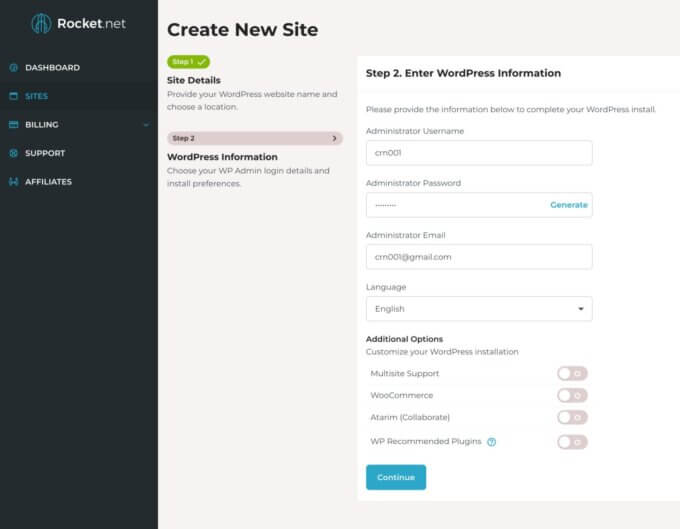
Then, you can manage your site from a dashboard that looks like this — notice how the different tabs give you access to various tools:
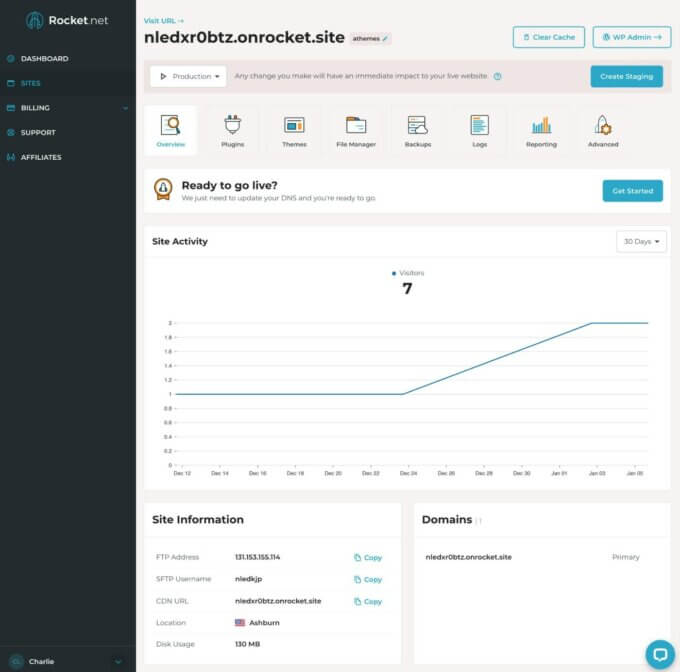
For example, the Backups tab lets you create manual backups and view the automated daily backups that Rocket.net takes:
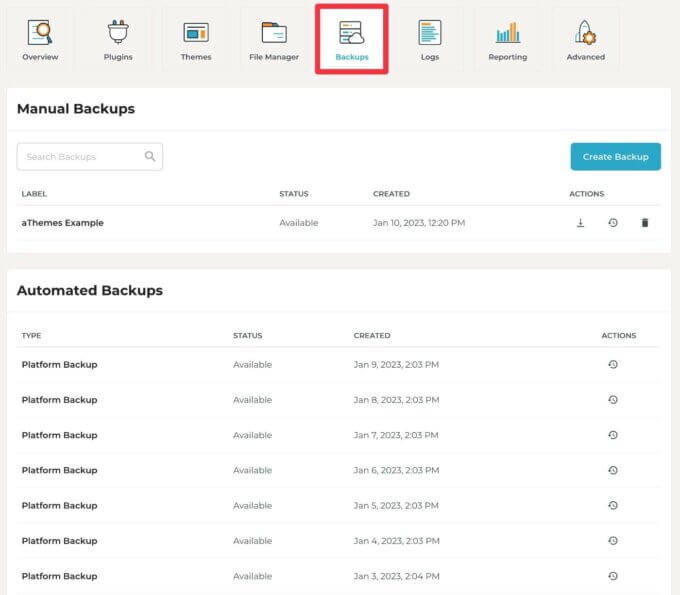
Rocket.net also offers a few unique dashboard tools.
One of my personal favorites is an in-browser WP-CLI terminal that lets you run WP-CLI commands without needing to manually connect via SSH:
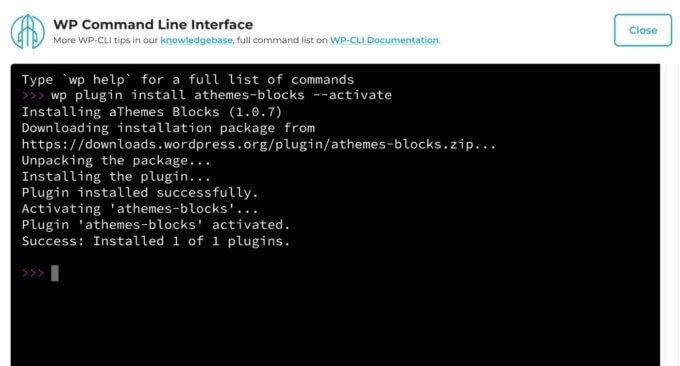
I’ve never seen this at any other WordPress host, and it could be something you find handy if you like working with WP-CLI.
You can also access WordPress activity logging from your hosting dashboard, which can be helpful for keeping an eye on your site:
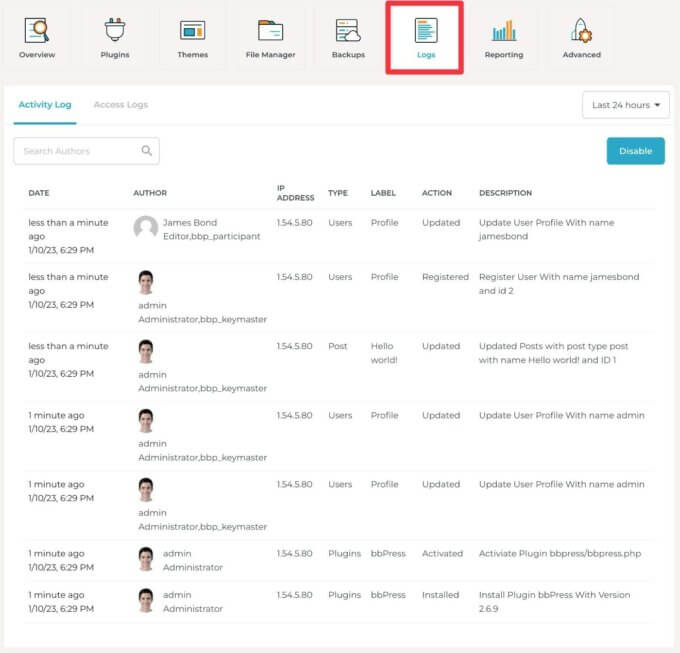
Overall, I think Rocket.net offers a high-quality dashboard. And the fact that I think Kinsta’s dashboard is still better shouldn’t reflect poorly on Rocket.net.
Kinsta Dashboard
Kinsta’s hosting dashboard is called MyKinsta.
The main Kinsta dashboard gives you a summary of everything that’s happening in your account, including activity in your hosting dashboard and resource usage:
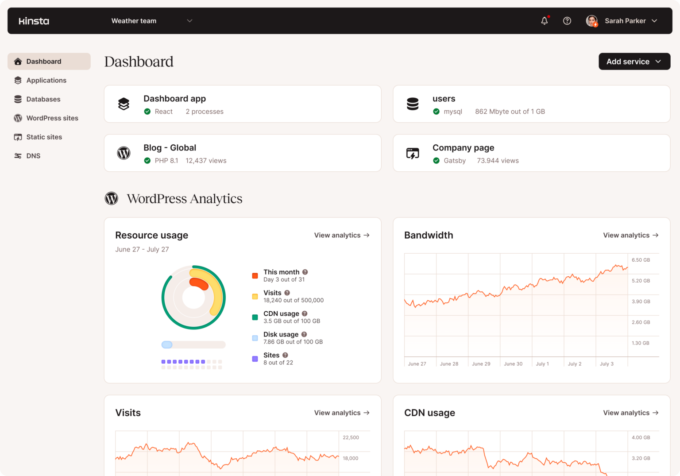
To create a new WordPress site, you get a handy installer wizard with preset configurations for WooCommerce and/or multisite:
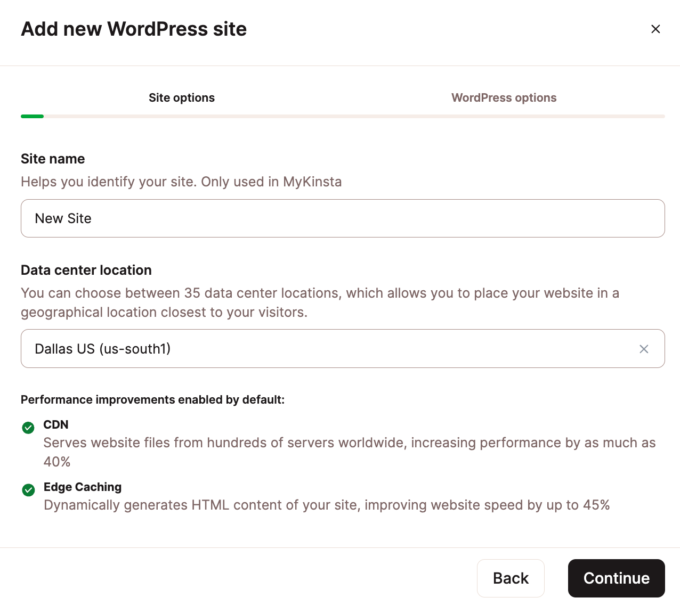
If you open a site’s dashboard, you’ll see all the details for that site, along with a sidebar that gives you access to all the various features and tools.
For example, if you visit the Backups tab, you can see all of the automatic backups that Kinsta takes and create an on-demand backup if needed.
You can also easily restore a backup to the live or staging version of your site:
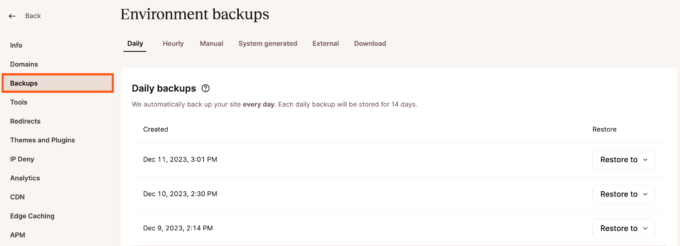
Kinsta gives you a lot of useful options in this dashboard. For example, here’s what the dedicated Tools tab gives you access to:
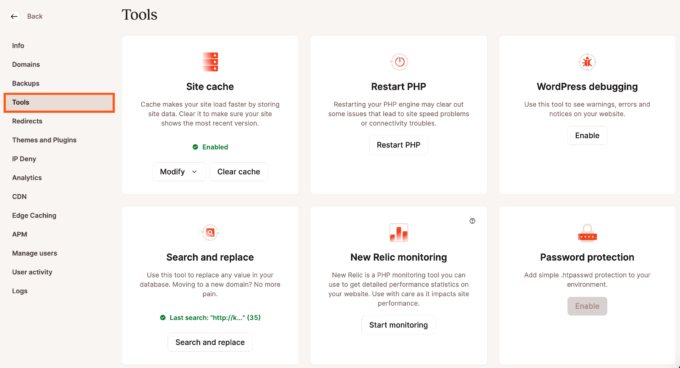
There are also separate areas for the redirect manager, application performance monitoring (Kinsta APM), IP bans, and more.
If you switch the toggle at the top, you can shift between live and staging environments. Staging environments give you pretty much an identical dashboard, along with the option to fully or partially push the staging site live.
Pricing and Plans
When it comes to Rocket.net vs Kinsta pricing, Rocket.net is cheaper pretty much across the board.
Both hosts use similar metrics for billing:
- Number of WordPress sites
- Storage
- Number of monthly visits across all of your sites
Both hosts also offer transparent pricing — there are none of the jacked-up renewal prices that you experience with cheap shared hosting. What you see on the pricing table is what you’ll pay both now and at renewal.
One of the biggest differences is in those visit limits — Rocket.net’s monthly visit limits are about 10-25X Kinsta’s visit limits for similarly priced plans.
If you have a high-traffic site, that can instantly make Rocket.net significantly cheaper than Kinsta.
When it comes to the other limits (storage and WordPress sites), Rocket.net is still a little bit cheaper, but the difference is not nearly as large.
Here’s a pricing table that compares the first three pricing tiers at each host:
| Plan | Price (monthly billing) | Websites | Storage | Visits |
|---|---|---|---|---|
| Rocket.net, Tier 1 (Starter) | $30 | 1 | 10 GB | 250,000 |
| Kinsta, Tier 1 (Starter) | $35 | 1 | 10 GB | 25,000 |
| Rocket.net, Tier 2 (Pro) | $60 | 3 | 20 GB | 1,000,000 |
| Kinsta, Tier 2 (Pro) | $70 | 2 | 20 GB | 50,000 |
| Rocket.net, Tier 3 (Business) | $100 | 10 | 40 GB | 2,500,000 |
| Kinsta, Tier 3 (Business 1) | $115 | 5 | 30 GB | 100,000 |
As you can see, there’s a massive difference in the number of visits that the plans support, with Rocket.net’s Pro plan supporting 20X the number of monthly visits that Kinsta’s Pro plan supports.
However, outside of that, the plans are pretty similar. Rocket.net is a bit cheaper and supports one extra site, but the differences are nowhere near as drastic as the visits.
Both hosts also let you pay overage fees if you need to exceed your plan’s limits.
This is especially important for monthly visits — neither host will cut off your site if you exceed your plan’s visit limits, but you will be charged an overage fee.
The overage fees for visits and storage are identical at both hosts:
| Overage fee | Rocket.net | Kinsta |
|---|---|---|
| Visitor overage fee | $1 / 1,000 visits | $1 / 1,000 visits |
| Storage overage fee | $2 / GB | $2 / GB |
Thoughts on Kinsta vs Rocket.net Pricing
Overall, how the pricing shakes out will depend on your specific situation.
If you have a single low-traffic site, Kinsta and Rocket.net are pretty similar: you’d pay $30 per month at Rocket.net and $35 per month at Kinsta.
However, if you have a high-traffic site, Rocket.net will likely be significantly cheaper. For example, if your site receives 1,000,000 visits per month, you’d pay ~$60 at Rocket.net but ~$675 at Kinsta — that’s serious money!
In that situation, using Rocket.net is probably the best decision — but more on that later.
A Quick Note on PHP Workers
One more advanced pricing difference that I didn’t touch on is PHP workers, which process PHP requests on your site.
PHP workers can be especially important for sites that need to serve uncached content, such as membership sites, WooCommerce stores, and so on.
They’re not as important for blogs or other content sites because almost all of your site’s visits will be served from the cache on Cloudflare’s network, which means those visits don’t require any PHP processing on your server.
Kinsta uses PHP workers as a plan limit: you’ll get anywhere from 2 to 14 PHP workers, depending on your plan. In contrast, Rocket.net advertises “unlimited” PHP workers on all plans.
Support Options and Availability
Both Rocket.net and Kinsta offer high-quality 24/7 support.
At Rocket.net, all plans offer support via live chat and ticketing.
If you’re willing to pay for the pricier enterprise hosting plans (from $650 per month), you also get access to phone support and your own private Slack channel.
At Kinsta, all support requests are handled through the Intercom chat widget, which offers a really nice experience. Support is also available in French, Italian, Portuguese and Spanish during select hours
However, one thing to note is that Kinsta doesn’t offer phone support on any of its plans — here’s Kinsta’s explanation for why that is.
Personally, I prefer live chat support anyway, so I don’t see any downside to this.
Additionally, though Rocket.net does technically offer phone support, you only get it if you’re paying $650+ per month, which probably isn’t a realistic situation for most webmasters.
For those reasons, I would say that the support quality/availability is pretty similar at both hosts, and I wouldn’t use it as a point of differentiation.
However, if you’re an enterprise and you want the ability to get someone on the phone, that might be a point in Rocket.net’s favor.
Live Chat Experience
In terms of the live chat experience, Rocket.net uses the LiveChat service, which requires you to enter your contact details to start a chat:
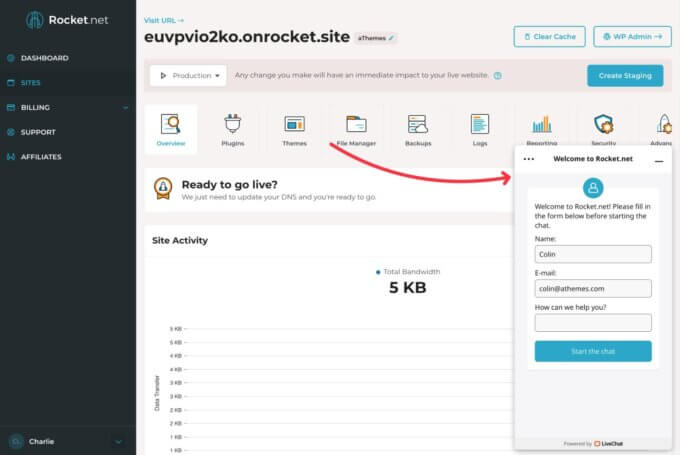
Kinsta uses Intercom, which automatically logs you in:
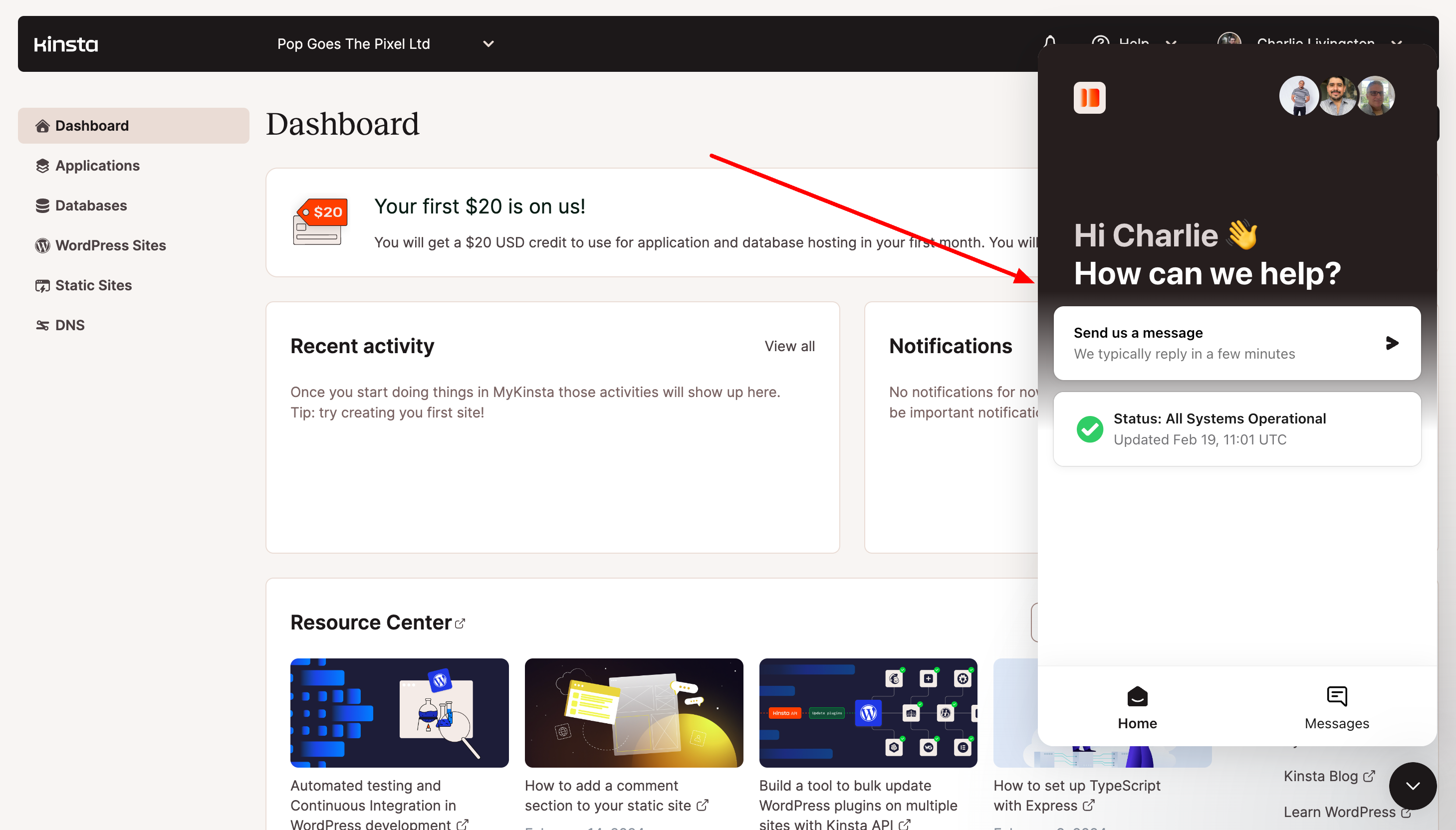
Both make it easy to chat, but I personally prefer the Intercom experience that Kinsta offers, even though it’s a relatively trivial difference.
Rocket.net vs Kinsta: Which One Should You Use?
Overall, Rocket.net and Kinsta are the two managed WordPress hosts that I regularly recommend, so I don’t think you’ll make a wrong decision either way.
Both offer excellent hosting products, and I think you’ll be happy regardless of which host you choose.
They also now use similar approaches to integrating Cloudflare into their services, which means you can benefit from full-page caching on Cloudflare on both hosts.
However, it’s tough to have a comparison post without making some more concrete recommendations, so that’s what I’m trying to do:
The Case for Rocket.net
One of the biggest advantages that Rocket.net has over Kinsta is its price.
You get a hosting product that’s just as good when it comes to performance and reliability, but at a lower price. That’s a pretty strong value proposition.
Again, it isn’t always the case that Rocket.net will be a lot cheaper.
But if you have a high-traffic site, Rocket.net will be significantly cheaper than Kinsta, so I think that’s a pretty strong reason to choose it (unless the stuff I talk about in the next section is really important for you).
The same is true if you need to host a lot of sites — because Rocket.net’s site limits are also higher than Kinsta’s, especially as you start moving up the pricing plans.
For example, $100 at Rocket.net lets you host up to 10 sites, whereas it would only get you 5 sites at Kinsta.
Beyond the price, I also think that Rocket.net has some big advantages for agencies or other people who are hosting client sites. Here are some really valuable features that are unique to Rocket.net:
- You can white-label the Rocket.net dashboard to use your own branding and even embed the dashboard in your own site.
- You can integrate with WHMCS to handle billing your clients.
- The Rocket.net API lets you provision sites via the API, which allows you to build your own custom systems.
If you want to control the billing relationship and offer these types of white-labeled conveniences to your clients, Rocket.net is definitely the better option.
If you want even more convincing, you can read our full Rocket.net hosting review.
The Case for Kinsta
One of the biggest advantages that Kinsta has over Rocket.net is a more fleshed-out suite of features and tools, which can be especially handy for developers/advanced users or enterprises.
Here are some advanced tools that Kinsta offers and Rocket.net doesn’t:
- Local WordPress development tool – DevKinsta lets you easily spin up local sites and push straight to Kinsta hosting.
- Application performance monitoring tool – Kinsta APM lets you really dig into your application’s performance without needing a third-party tool such as New Relic.
- More powerful staging tool – You can do conditional staging pushes, whereas Rocket.net only lets you fully overwrite your site. Kinsta also offers a premium staging add-on that lets you deploy up to 5 staging environments.
- External backup add-on – There’s an add-on that lets you send backups to your own external cloud storage (for an extra fee).
- More frequent backups – In addition to the external backups, there are paid add-ons that let you increase the backup frequency to every six hours or even every hour.
- SOC 2 Compliance – Kinsta earned SOC 2 compliance in 2023, which adds an extra layer to its security features and a provider you can trust to handle your data.
Kinsta’s dashboard also generally offers a lot more tools, which can help all types of users. For example, you can manage redirects, block IP addresses, run a search and replace, set up country-specific redirects, and lots more.
While Rocket.net also has some useful tools, I would still put Kinsta’s MyKinsta dashboard well ahead of Rocket.net. In addition, Kinsta’s site management dashboard is multilingual and available in English, Spanish, German, Dutch, Portuguese, Italian, French, Swedish, Danish and Japanese.
Are those improvements worth paying more?
I really think that it depends on your situation.
For a solo user running a basic blog, they’re probably not.
But for more advanced users, businesses, and agencies/freelancers, those add-ons could definitely tip things in Kinsta’s favor. For a more cost-effective solution, Kinsta also offers single-site plans for single WordPress sites with increased traffic or resource usage (like membership or eCommerce sites).
For example, if Kinsta APM can help you increase the performance of your membership site, hourly backups allow you to keep your membership site’s data safe, and more flexible staging lets you more easily work on your site, then that’s definitely worth the money, I think.
Plus, it’s worth remembering that Kinsta is not always more expensive. It really depends on how many websites you’re hosting and how many monthly visits they receive.
If you only have a single website with 20,000 monthly visits, Kinsta basically costs the same as Rocket.net, so you’re getting all that extra stuff at no extra cost.
Final Thoughts on Kinsta vs Rocket.net
To recap one more time, Kinsta and Rocket.net are both excellent, top-tier hosts, so you’re not going to make a wrong decision no matter what.
They also use similar approaches, with both integrating Cloudflare into their stacks in a big way (including caching your site’s pages on Cloudflare’s global network).
It’s really just about choosing the one that’s a better fit for your needs — Rocket.net is a little cheaper while still offering excellent performance (and a lot cheaper for high-traffic sites), while Kinsta offers more advanced tools and options in its top-tier MyKinsta dashboard.
To discover even more quality hosts, you might want to check out our full roundup of the fastest WordPress hosting.
Do you still have any questions about Rocket.net vs Kinsta WordPress hosting? Let us know in the comments!



